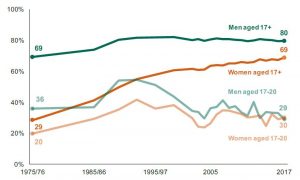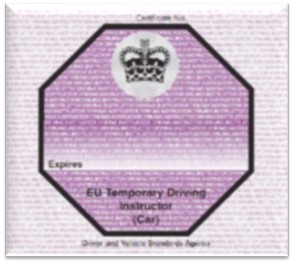 So what’s new? In December 2018 I wrote about the government’s proposed ADI cycle training scheme. Back in November the report on the NASP meeting with DVSA talked about the agency’s proposed Mock Test guidance. Now we learn that DVSA is to start trialling sending text messages to driving test candidates before they sit their practical driving tests.
So what’s new? In December 2018 I wrote about the government’s proposed ADI cycle training scheme. Back in November the report on the NASP meeting with DVSA talked about the agency’s proposed Mock Test guidance. Now we learn that DVSA is to start trialling sending text messages to driving test candidates before they sit their practical driving tests.
John's Blog Posts
A spoke in the wheel for government’s ADI cycle training scheme
 Readers of this blog will recall that the minister with the brief to cover road safety and cycling, Jesse Norman, announced a £500K project in August that will offer ADIs training to ensure cyclists’ safety is at the forefront of their minds when they teach new drivers. Teaching driver trainers how to teach learners now to handle cyclist.
Readers of this blog will recall that the minister with the brief to cover road safety and cycling, Jesse Norman, announced a £500K project in August that will offer ADIs training to ensure cyclists’ safety is at the forefront of their minds when they teach new drivers. Teaching driver trainers how to teach learners now to handle cyclist.
Time to change gear

My wife Carol and I have decided that, after 35 years of working for the Motor Schools Association of Great Britain, the time has come for us to have a change of gear and we plan to retire soon after the association’s National Conference in Nottingham in March.
We hope to see as many MSA GB members there as possible so that we can thank you for the fantastic support we have received over the years.
I will not be standing for the role of President of the European Driving Schools Association (EFA) when my period of office comes to an end in May next year.
After we retire we hope to do some travelling and have a proper look at some of the places we have only been to for flying visits, spend some time in the garden and generally relax.
4 CommentsWhat’s the best way to look after most vulnerable road users?
 In May (Everyone has an opinion on road safety) I reported that I had attended a meeting to discuss the Department of Transport ‘Call for Evidence Cycling and Walking Investment Strategy: Safety Review’.
In May (Everyone has an opinion on road safety) I reported that I had attended a meeting to discuss the Department of Transport ‘Call for Evidence Cycling and Walking Investment Strategy: Safety Review’.
That meeting was attended by a wide variety of stakeholders including representatives from transport operators, cycling and walking organisations, associations representing other road users, disability groups, road safety professionals, researchers and academics, community health bodies, ADIs, cycle trainers, and other interested parties.
Following on from that Call for Evidence wit emerged in August that ADIs were to be offered bespoke training to ensure cyclists’ safety is at the forefront of their minds when they teach new drivers, as part of the Department for Transport’s Cycling and Walking Safety Review. The review’s aim is to make walking and cycling the natural choice for shorter journeys, or as part of a longer one, rather than driving. This, of course, fits into the higher order skills outlined in the GDE Matrix Level Three “modal choice”
Leave a CommentCyclical road safety campaigns

Over the years there have been various campaigns to toughen up road safety standards. Like so many campaigns, however, things tend to be cyclical and come around several times before anything is done.
Here are a handful of examples that immediately spring to mind to prove my point:
Single/Double British Summertime (SDST)
Campaigners say that one of the consequences of the UK’s current time system is that more people are killed and injured on the road because of darker evenings in the autumn and winter than there would be if we used SDST.
Leave a CommentNo pupils? Don’t believe everything you read!

During July the Department for Transport produced a whole heap of data on who holds a driving licence and why some don’t want to. The figures are part of the statistics and data about the National Travel Survey, which is based on an annual survey to monitor trends in personal travel.
One of the big stories coming out of the figures was a perception that ADIs were going to struggle in the future, as young people were losing interest in learning to drive. Indeed, that story made it on to Radio 5 Live. Yet in fact the actual findings painted a very different story, as I will explain.
Leave a CommentTransport Tribunal makes landmark ruling
 The Transport Tribunal – that’s the body that ADIs can appeal to, if the ADI Registrar decides to remove them from the register, and is more properly known as the First-tier Tribunal, (General Regulatory Chamber) Transport – has recently published something of a landmark decision in an appeal.
The Transport Tribunal – that’s the body that ADIs can appeal to, if the ADI Registrar decides to remove them from the register, and is more properly known as the First-tier Tribunal, (General Regulatory Chamber) Transport – has recently published something of a landmark decision in an appeal.
The case in question was heard in April but the ruling has only recently been released. It involved an ADI appealing against his removal from the register and marks, as far as I can recall, the first time the Tribunal has dismissed an appeal against such a decision even though it involved no criminal or motoring convictions. The tribunal found that the appellant (the ADI) could not satisfy the statutory requirement to be a ‘fit and proper person’.
4 CommentsEveryone has an opinion on road safety

I recently attended a meeting called by the Department of Transport to discuss its Call for Evidence Cycling and Walking Investment Strategy: Safety Review.
The meeting was attended by a wide variety of stakeholders including representatives from transport operators, cycling and walking organisations, associations representing other road users, disability groups, road safety professionals, researchers and academics, community health bodies, cycle trainers, and other interested parties.
Leave a CommentGraduated licences do have my support

John Miller, author of the Driving Instructor’s Handbook and someone whose views I have long respected, recently took me to task for not being more supportive of the idea of Graduated Driver Licencing (GDL).
I don’t think that’s necessarily true; indeed, I think I have on behalf of MSA GB supported GDL for many years. Indeed, the following is an extract from the oral evidence I gave on behalf of MSA GB alongside Robin Cummins OBE, road safety consultant, BSM (and previously chief driving examiner); and Steve Grigor, then driving examiners’ branch secretary, PCS Union, to the House of Commons Transport Committee Inquiry into Novice Drivers. It clearly shows that all three of us supported graduated licensing.
2 CommentsEU equivalence legislation creates subtle change in UK supervising driver rules
 The question of who can supervise a learner driver, and in what kind of vehicle, is one that is fraught with difficulties and pitfalls.
The question of who can supervise a learner driver, and in what kind of vehicle, is one that is fraught with difficulties and pitfalls.
As I understood it to supervise a learner in any category a Supervising Driver must: be at least 21 years old; have a full driving licence (for the type of vehicle being used – manual or automatic); have held that valid licence for a minimum of three years; ensure the car is in a safe and legal condition; and meet the minimum eyesight standards.
However, it seems that – and not for the first time – I was wrong, and I have received the following statement from the DVSA.
The Driving and Motorcycle Riding Instructors (Recognition of European Professional Qualifications) Regulations 2016 enables instructors from other member states to have their instructor qualification recognised.
5 Comments